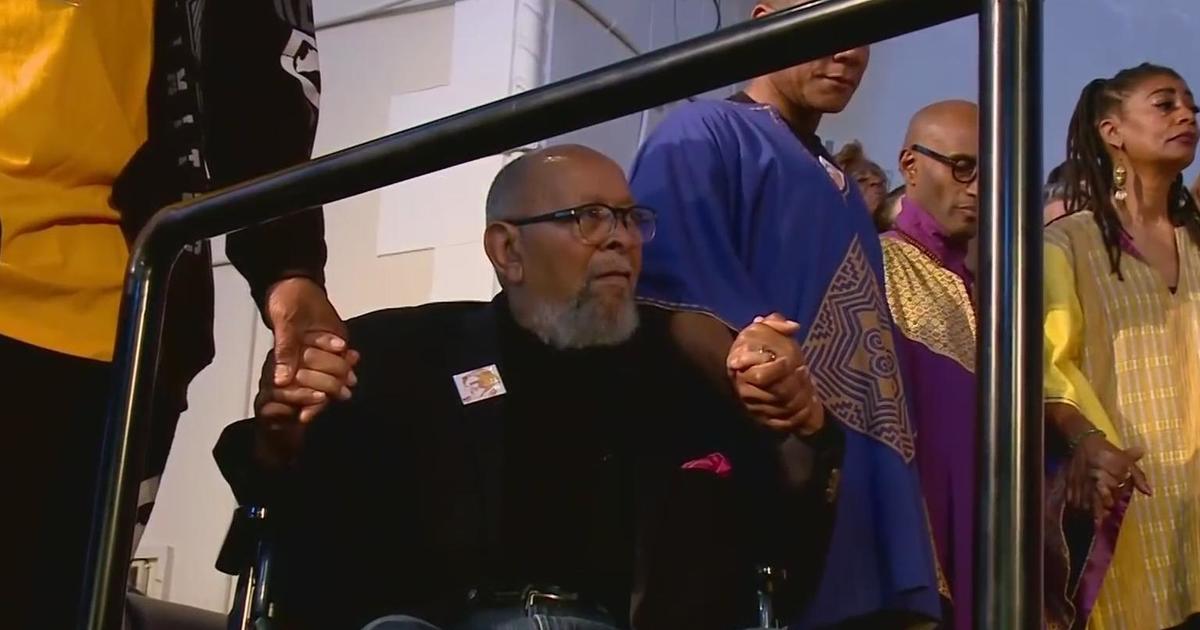UC Think Tank Applauds New Pentagon Position On Military Gays
SANTA BARBARA (CBS / AP) -- A University of California think tank declared Tuesday that the debate over the U.S. military's 17-year-old "don't ask, don't tell" ban is over now that the Pentagon's top leaders want the ban scrapped, pointing to a new survey showing most troops won't mind.
"The debate about the evidence is now officially over," said a statement from scholars at the Palm Center at UC-Santa Barbara, which has been an academic leader in commissioning and disseminating research in the areas of gender, sexuality, and the military since 1988.
President Barack Obama, citing the troop poll, urged the U.S. Senate to repeal the ban before adjourning in the next few weeks, but there is still no indication GOP objections can be overcome with just a few weeks left in the postelection lame-duck session. Still, the survey did put new pressure on Republican opponents, led by Sen. John McCain, who claim efforts to repeal the law are politically motivated and dangerous at a time of two wars.
"In light of the report's findings, this month's debate in Congress is about one thing and one thing only: Will prejudice continue to determine military policy or not?" wrote the 30 professors and scholars at UC's Palm Center.
Defense Secretary Robert Gates said the ban on openly gay military service "requires people to lie," and he too called for quick Senate action.
"We spend a lot of time in the military talking about integrity and honor and values. Telling the truth is a pretty important value in that scale," Gates said as he released the Pentagon study showing that most people currently in uniform don't care about the ban.
Senate Democrats planned to force a vote in December. Senate Republicans were generally silent following release of the Pentagon recommendations for repealing the ban.
Although historic, Tuesday's recommendation that the military for the first time allow openly gay people came with a caveat that also frustrates many supporters of repeal. Gates wants an indefinite grace period while the Pentagon prepares for the policy change and phases it in.
"It would be unwise to push ahead with full implementation of repeal before more can be done to prepare the force, in particular those ground combat specialties and units, for what could be a disruptive and disorienting change," Gates said.
Critics led by McCain said the Pentagon's report doesn't address risks to morale and fighting mettle. Gates countered: "I obviously have a lot of admiration and respect for Senator McCain, but in this respect I think that he's mistaken."
Obama has called it a top priority to repeal the 1993 law that bans openly gay service. But gay rights groups have complained that he and Senate Majority Leader Harry Reid have done too little to see it through, focusing their post-election efforts instead on tax cuts and a nuclear arms treaty with Russia before Republicans gain congressional strength when lawmakers return in January.
In the report, the study's co-chairs, Pentagon General Counsel Jeh Johnson and Army Gen. Carter Ham, wrote, "We are both convinced that our military can do this, even during this time of war."
Gates said he didn't think the Pentagon would have to rewrite its regulations on housing, benefits or fraternization to accommodate gays if they were allowed to serve openly.
A defense policy bill that would overturn the law - pending certification by the Pentagon and the president that doing so wouldn't hurt the military's ability to fight - has languished in the Senate since it passed the House this spring.
In the meantime, a federal judge ordered the Pentagon to stop enforcing the law because it was unconstitutional. The Obama administration is appealing that decision.
"Given the present circumstances, those that choose not to act legislatively are rolling the dice that this policy will not be abruptly overturned by the courts," Gates said.
Obama said in a statement released by the White House: "Today I call on the Senate to act as soon as possible so I can sign this repeal into law this year and ensure that Americans who are willing to risk their lives for their country are treated fairly and equally."
The president noted that the Pentagon survey had found most service members willing to serve alongside openly gay and lesbian troops, and said: "I am absolutely confident that they will adapt to this change and remain the best led, best trained, best equipped fighting force the world has ever known."
White House press secretary Robert Gibbs said repealing the ban was discussed during a two-hour meeting Tuesday between Obama and lawmakers and was the sole focus of a session Monday with the military service chiefs. He declined to provide more details.
Adm. Mike Mullen, chairman of the Joint Chiefs of Staff, said Tuesday he agreed with Gates that "this is a policy change that we can make and we can do it in a relatively low-risk fashion," given time to prepare forces and leaders for new rules and expectations.
Advocates for repeal said Congress was running out of excuses to change the law before the courts do it for them. The Justice Department is fighting the recent federal ruling that the 1993 law is unconstitutional.
"For senators who were on the fence - Republicans as well as Democrats - this report should address most if not all the concerns that they have raised," said Aubrey Sarvis, executive director of the Servicemembers Legal Defense Network, a pro-repeal advocacy group.
The Pentagon survey found that some two-thirds of troops don't care if the ban is lifted. Of the 30 percent who objected, most of them were in combat units.
Opposition was strongest among combat troops, with at least 40 percent saying repeal would be a bad idea. That number climbed to 58 percent among Marines serving in combat roles.
A summary of the report said 69 percent of respondents believed they had already served alongside a gay person. Of those who believed that, 92 percent said their units were able to work together and 8 percent said the units functioned poorly as a result.
"We have a gay guy. He's big, he's mean and he kills lots of bad guys. No one cared that he was gay," the report quotes a member of the special operations force as saying.
The report says that many gay troops would be likely to keep their sexual orientation quiet even after the ban was lifted. That discretion would probably be more common in the military than in the civilian world, the report's authors said.
Of those respondents who said they were gay, only 15 percent said they would want that known to everyone in their unit.
The summary included anonymous quotes from gay troops currently serving.
"I will just be me," one person said. "I will bring my family to family events. I will put family pictures on my desk. I am not going to go up to people and say, 'Hi there. I'm gay.'"
Though some troops suggested during the study that there should be separate bath and living facilities for gays, the report recommended against it because it would be a "logistical nightmare, expensive and impossible to administer."
Further, separate facilities would stigmatize gays and lesbians in the way that "separate but equal" facilities did to blacks before the 1960s, it said.
The report said commanders could address individual concerns on a case-by-case basis.
Reid, D-Nev., has promised a vote on the matter by the end of the year, after hearings can be held this week. But if he fails, the bill's chances of survival are dim as the new Congress takes over in January. Republicans have seized control of the House and the Democratic majority in the Senate becomes even more narrow.



